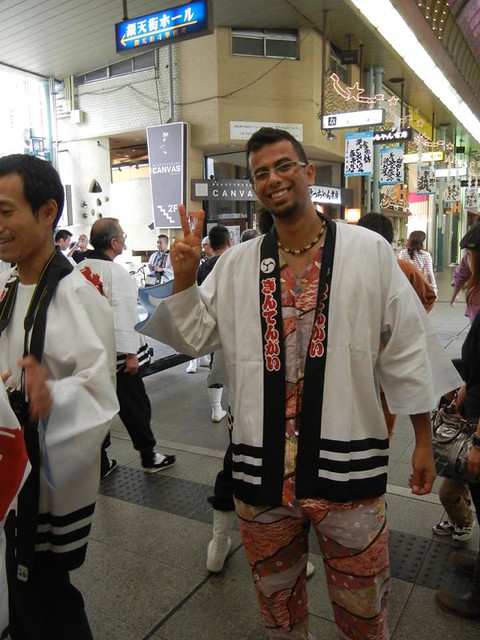What’s your name, when and where was your placement, and where are you from originally?
Abdulla Zokari. I was placed originally in Imabari in 2011, but I got married to a foreigner in Matsuyama and was able to transfer to that school to live with my wife 🙂
Originally I’m from Yemen, but moved to Canada at 13 and learned English, then moved to Japan in 2010 at 23 years old to work for a private company (iTTTi PKC) in Ozu. That year I applied for the JET program, flew back for two weeks to take the interview, returned to Japan, then found out I was a successful candidate for 2011 JET programme. Not a typical JET story lol.
How did you find out about JET, and what led you to apply?
I was in Ozu working night shifts. All foreigners in Ozu and Matsuyama seemed to have an easier, higher paying, more fun job with benefits and vacation days. Turns out it’s called JET. I applied, asking for Matsuyama, and they gave me Imabari. Close enough, eh? Ha.
What did you hope to achieve on JET, and did that change during your time here?
I was hoping to get elementary school kids to be able to read and write before going to JHS, as the focus back then was just getting the kids to like English with basic chants and easy grammar.
In my second year, my elementary schools allowed me to create and implement my own curriculum, from scratch, as a trial run. That year, my 5th and 6th graders were able to read and write at a JHS 1st year level. But what was more important for me was that they were now so motivated to learn because they saw how fun and rewarding learning can be. They used to come to my classroom during the 4 breaks just to learn a little more phonics.
I was satisfied with that achievement, as I have passed on my love of learning English to others 🙂
What is your lasting impression of the work you did on JET and the communities you were part of?
Working in Japan changes you. I gained different perspectives, and I learned a lot about how a community could come together and work together, which is something you don’t often see in the West. I’m still in touch with people I met while working for JET and some of the students I taught.
I think as JETs, we touch the lives of so many people and a lot of the time those impressions last for generations, both for the Japanese community and for us foreigners. I mean… here I am talking about JET 5 years after my contract has concluded 😉 Also, everyone should sign up with the Matsuyama International Center, because they’re always looking for volunteers to do cool stuff!
Where did JET lead you?
I loved teaching from my first year there, so I enrolled in a TESL programme in Canada. By the time I finished my JET contract, I had acquired my teaching license. When I returned to Canada I found employment as a supply teacher for a year, then landed a permanent ESL teaching job in my hometown’s board of education 🙂
Right now, some incoming JETs have been delayed by more than a year, and are in the difficult position of choosing to indefinitely wait for Japan to open up or to give up on coming here. Do you have any comments or advice for them during this time?
I don’t think anyone should consider Japan to be a final destination. One can go for 1 year or up to 5 with the JET programme. It’s an amazing country to work in and gain life experiences. Some have even decided to live there permanently, but the majority, and I mean 19 out of 20 JETs per year, return home after their contracts expire.
This mentality is extremely important during these times. JETs stuck at home or in Japan must have a plan for after JET. If they don’t, they’ll go to Japan for 5 years and realize they’re back in the same spot as when they left their home countries, except now they’re older. It’s imperative that this year’s JETs begin planning out their careers/interests for after Japan. COVID has shown that JET doesn’t offer a lot of job security, but is something that can affect lives forever.
Don’t give up on Japan. Take this time to develop new skills/hobbies/connections. I’ve seen JETs ranging in ages between 21 and 51, which means this one-year limbo should be used effectively to set up a more fun and rewarding JET experience when it’s open again.
If you had been in their position, do you think you would have gone on JET if you’d been in limbo for a year?
If I was financially okay with being in JET limbo, then yes, absolutely. I was fortunate to have lived 6 years in Japan, and I can tell you that living in a new country, making new friends, struggling with finances are all experiences that will give you insights and connections that can never be duplicated.
Don’t let COVID rob you of a life-changing experience. It took you a year to be accepted into the JET programme. You can wait another year. Make money and put it into savings to start your JET career comfortably 🙂















Leave a Reply